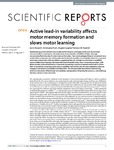Active lead-in variability affects motor memory formation and slows motor learning
Date
2017-08-10Author
Subject
Metadata
Show full item recordAbstract
Rapid learning can be critical to ensure elite performance in a changing world or to recover basic movement after neural injuries. Recently it was shown that the variability of follow-through movements afects the rate of motor memory formation. Here we investigate if lead-in movement has a similar efect on learning rate. We hypothesized that both modality and variability of lead-in movement would play critical roles, with simulations suggesting that only changes in active lead-in variability would exhibit slower learning. We tested this experimentally using a two-movement paradigm, with either visual or active initial lead-in movements preceeding a second movement performed in a force feld. As predicted, increasing active lead-in variability reduced the rate of motor adaptation, whereas changes in visual lead-in variability had little efect. This demonstrates that distinct neural tuning activity is induced by diferent lead-in modalities, subsequently infuencing the access to, and switching between, distinct motor memories.
Collections
Publisher
Place of Publication
Journal
Volume
Issue
Pagination
Number
Recommended, similar items
The following license files are associated with this item:


